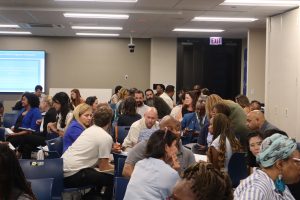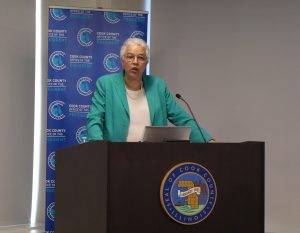County seeks input on stimulus-funded programs
By Igor Studenkov For Chronicle Media — September 4, 2024
Attendees discussed the issues that they believe Cook County should prioritize as American Rescue Plan funding runs out. (Photo by Igor Studenkov/For Chronicle Media)
The federal American Rescue Plan Act allowed Cook County to launch 73 programs to address everything from mental health issues to flooding.
However, the funding is expected to run out in 2026, and there’s simply no way to keep all those programs running.
This is why the Office of Cook County President is reaching out to the public to get their feedback on what programs the county should prioritize as it tries to figure out the post-ARPA funding picture.
On Aug. 28, the office held the first of the four public meetings. Cook County commissioners are expected to hold their own meetings at the beginning of September. The county’s chief financial officer will use input, along with analysis of the programs’ effectiveness, to develop recommendations for which programs will stay and which will go.
During the meeting, which was held in Chicago’s Dunne Cook County Administration Building, attendees raised support for veterans, people impacted by domestic violence and homelessness, and children in general, as major priorities.
Graciela Garcia, organizer for the Little Village Community Council, pointed to the fact that ARPA funding can’t be used to help undocumented immigrants. This means that organizations like hers, which help immigrants regardless of their legal status, are missing out on funding.

Cook County Board President Toni Preckwinkle encourages residents to weigh in on the future of ARPA-funded programs. (Photo by Igor Studenkov/For Chronicle Media)
ARPA was the last of the three federal stimulus packages designed to address the economic fallout from the COVID-19 pandemic. Under federal allocations, Cook County received around $1 billion. Around $194.38 million of that went into the county budget, mostly to cover operational costs and capital projects. Around $805.78 million went toward community programs.
The 73 programs broadly fall into six areas:
- Health and wellness
- Economic development
- Public safety and justice
- Resiliency in the face of climate change
- Infrastructure and technology improvements and what the county called “good government”
- Investments aimed at improving county operations and policies.
The Office of Cook County President press release highlighted several programs. The Guarenteed Income pilot gave 3,250 low-income county residents $500 a month from December 2022 to December 2024. The Medical Debut Relief program used ARPA funding to buy county residents’ medical debt so that they could cancel it. The county offers the CountyCare Medicaid expansion plan to low-income residents, and the Cook County Health system is one the biggest charity care providers in the Chicago area. It also spotlighted the variety of violence prevention initiatives that include investments in law enforcement, grants to anti-violence organizations, and funding to help youth who were impacted by violence, whether as perpetrators, victims or both.
In a presentation during the August meeting, county officials also highlighted mental health service expansion, small business loans and grants, water and sewer system upgrades, funding for projects to reduce pollution, broadband internet expansion in a few relatively rural parts of Cook County, and funding to help residents fix up their homes.
Cook County Board President Toni Preckwinkle described ARPA funding as the biggest kick starter for change since the New Deal. She noted that her office got public input when they narrowed down the list of 73 programs, so it made sense to come back to the community now.
“Now we’re engaging in a similar process to see what programs we should prioritize beyond 2026, when ARPA resources run out,” Preckwinkle said. “The reality [is that] we won’t be able to continue funding over 70 ARPA programs.”
Preckwinkle’s chief of staff Lanetta Haynes Turner emphasized that the community engagement was important part of the decision-making process.
“The most effective solutions form from the ground up, [from] the people who live and work in our communities every day,” she said.
Mykel Selph, who heads the office’s diversity, equity and inclusion efforts, said that the county “need[s] to look at whether we can continue the programs with other funds, such as grant funding, and we need to evaluate our programs for effectiveness and financial feasibility.”
County Commissioner Frank Agular, D-16th, urged the residents to speak out.
“This is very important,” he said. “It’s your money, and you can say where your money should be going in.”
County officials invited attendees to fill out surveys, either in print or online, and invited them to ask questions.
When asked whether any of the programs are helping veterans, Deanna Love, the county’s director of veteran affairs, said that one of the programs used around $1.5 million to support 18 organizations that serve veterans to help around 25,000 veterans and their families find housing and/or jobs, as well as get mental and physical health services.
When asked how ARPA funding is used to help the homeless, Xochitl Flores, chief of the county’s bureau of economic development, said that the pandemic highlighted how the suburban model of providing overnight shelter for homeless individuals in houses of worship came up short. This led the county to invest ARPA funding in buying up hotels to convert into shelters, providing grants to tenants struggling to pay rent and building supportive housing, where residents who experienced homelessness in the past get shelter and access to support services on site.
When asked how the ARPA funds are used to support victims of domestic violence and their children, Avik Das, the executive director of the Cook County Justice Advisory Council, said that ARPA funding improved services. One major thing they’re working toward, he said, was that people don’t have to struggle to find resources.
“[It’s about] how the county shows up for the whole person,” Das said.
In addition to the Aug. 28 meeting, the county will hold one more meeting on Chicago South Side and two meetings in the suburbs. All meetings will run between 6 and 7 p.m. The South Side meeting will be held on Sept. 4 at Kennedy King College, 6301 S. Halsted St. South Holland’s South Suburban community college will host the first suburban meeting on Sept. 5, and Palatine’s Harper College will host a meeting on Sept. 11. The commissioner meetings have not been announced by deadline.
To fill out the community survey, visit arpa.cookcountyil.gov/survey







